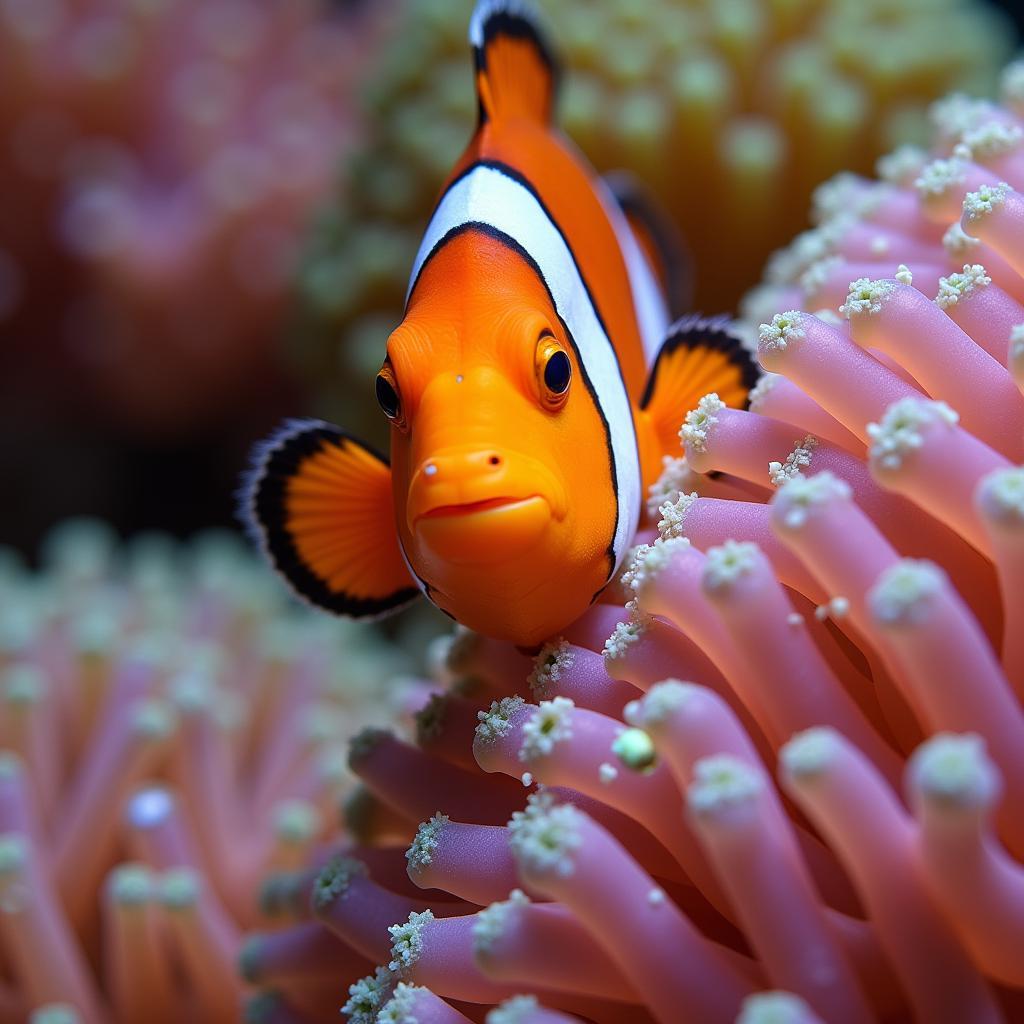Clownfish, those iconic orange and white fish made famous by the movie “Finding Nemo,” are fascinating creatures with a specific diet. While we might imagine them nibbling on coral reefs all day, their culinary preferences are surprisingly diverse. Let’s explore the intriguing world of clownfish and discover what exactly keeps these beloved fish well-fed.
What’s on the Menu for a Clownfish?
Clownfish are omnivores, meaning they enjoy a mixed diet consisting of both meat and plant-based foods. Their natural habitat, the coral reefs, provides a diverse buffet of options. Here’s a closer look at what makes up a clownfish’s daily meals:
- Algae: Surprisingly, algae make up a significant portion of a clownfish’s diet. They graze on the algae growing on the rocks and coral reefs in their surroundings.
- Zooplankton: Tiny marine animals that drift through the water, such as copepods and krill, are another staple food source for clownfish.
- Phytoplankton: These microscopic plants are another important part of their diet, providing essential nutrients.
- Small Invertebrates: Clownfish aren’t afraid to be opportunistic eaters. They will readily consume small invertebrates like worms, crustaceans, and even tiny jellyfish that wander into their territory.
- Fish Eggs and Larvae: Sometimes, clownfish even indulge in a little caviar! They have been known to snack on the eggs and larvae of other fish, including their own species.
- Leftovers from Their Anemone Host: Clownfish have a symbiotic relationship with sea anemones. They live within the stinging tentacles of the anemone, gaining protection from predators. In return, the clownfish helps keep the anemone clean and even shares food with its host. This includes scraps from the anemone’s meals and parasites that might harm the anemone.
 Clownfish Eating Anemone Scraps
Clownfish Eating Anemone Scraps
How Do Clownfish Find Their Food?
Living in coral reefs, which are teeming with life and vibrant colors, presents both opportunities and challenges when it comes to finding food. Clownfish have adapted to become resourceful hunters and scavengers. They use their keen eyesight to spot prey and are quick to snatch up anything edible that drifts by in the current. Their small size and agility allow them to navigate the nooks and crannies of the reef, uncovering hidden treasures of algae and invertebrates.
Feeding Clownfish in an Aquarium
If you have pet clownfish, providing them with a varied and balanced diet is crucial for their health and well-being. High-quality flake food formulated for omnivorous marine fish can form the base of their diet. Supplement this with a variety of frozen and live foods, such as brine shrimp, mysis shrimp, krill, and chopped seafood. Offering algae-based foods, such as spirulina flakes or nori (dried seaweed), is essential to replicate their natural grazing habits.
The Importance of a Varied Diet for Clownfish
Just like humans, clownfish benefit from a varied diet. Eating a range of foods ensures they receive all the necessary nutrients, vitamins, and minerals for optimal health, vibrant coloration, and a robust immune system. A varied diet can also prevent boredom and encourage natural foraging behaviors in your aquarium.
Fascinating Facts About Clownfish and Their Diet
- They Have a Sweet Tooth (Sort Of): Studies have shown that clownfish are attracted to the scent of certain amino acids found in the mucus of corals. This suggests they might have a preference for certain tastes.
- They Are Team Players: Clownfish are known for their symbiotic relationship with sea anemones, and this partnership extends to their feeding habits. They share food with their anemone host and help keep it free of parasites.
- They Can Be Picky Eaters: Just like any other animal, clownfish can develop individual preferences for certain foods. Some might favor algae over meaty treats, while others might have a particular fondness for brine shrimp.
Conclusion
Understanding what clownfish eat gives us a glimpse into their fascinating lives in coral reefs. Their adaptable diet and symbiotic relationships are testaments to their resilience and importance within their ecosystem. Whether you’re an aquarium enthusiast or simply fascinated by marine life, appreciating the dietary needs of these captivating creatures enhances our connection to the wonders of the underwater world.
If you’re interested in learning more about clownfish or need help choosing the right food for your aquatic companions, don’t hesitate to contact us. Our team at Mina Cones Food is here to help you provide the best care for your finned friends. Call us at 02437655121, email us at minacones@gmail.com, or visit us at 3PGH+8R9, ĐT70A, thôn Trung, Bắc Từ Liêm, Hà Nội, Việt Nam. We have a dedicated customer support team available 24/7.